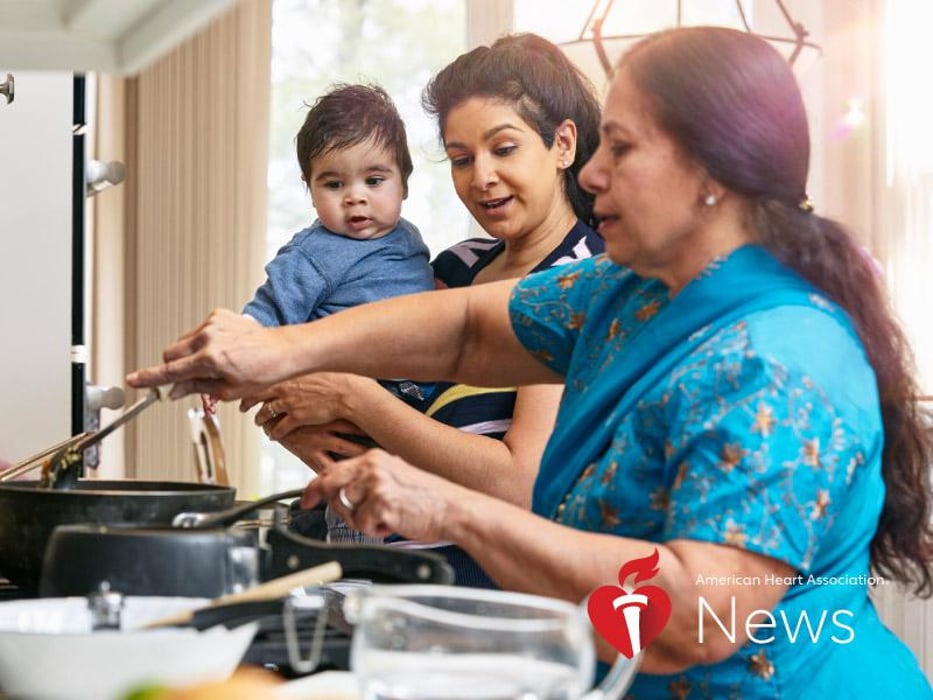AHA News: Health Class May Influence Heart Risk in South Asians

TUESDAY, Nov. 16, 2021 (American Heart Association News) -- A health education class tailored to South Asian culture was associated with improvements in certain cardiac risk factors and lower odds of death among participants, a new study shows.
South Asians – those with ethnic descent from India, Pakistan, Bangladesh, Nepal, Sri Lanka, the Maldives or Bhutan – develop coronary artery disease at an earlier age compared to non-Hispanic white people. But assessment tools underestimate their risk, according to a 2018 report from the American Heart Association. South Asian people also are more likely to be hospitalized or die from coronary artery disease than people of other races and ethnicities.
Hoping to understand the influence of health education on this high-risk group, researchers reviewed medical records of 1,517 adults of South Asian descent who were 43 years old on average when they attended the Heart Health for South Asians program between 2006 and 2019.
After an average of seven years of follow-up, participants had increased their "good" HDL cholesterol by 3.2 milligrams per deciliter on average. They lowered their triglycerides by an average 13.7 mg/dL and reduced "bad" LDL cholesterol by an average 8.4 mg/dL. LDL cholesterol is a strong predictor of coronary artery disease, the researchers said.
"The long-lasting positive change in the risk factor profile in these participants was promising," said researcher Dr. Paniz Vafaei, a third-year fellow in cardiology at Kaiser Permanente in San Francisco.
However, systolic blood pressure (the top number in a reading) did not decline, and the average drop in diastolic blood pressure (the bottom number) was only one point. Although body mass index and A1C (a measure of blood sugar) were slightly lower one year after attending the class, those reductions weren't sustained over the longer follow-up period.
Nevertheless, those who attended the class had lower odds of dying or needing a revascularization procedure such as angioplasty or bypass surgery than their counterparts who hadn't attended the class.
Researchers adjusted for use of cholesterol-lowering statin medication, but did not measure specific lifestyle changes. They acknowledged it is possible class participants already were motivated to make lifestyle changes that led to the improvements.
The findings were reported Saturday at the AHA's virtual Scientific Sessions and are considered preliminary until published in a peer-reviewed journal.
People of South Asian descent are often placed in an overall "Asian" category in research studies, even though they have a higher death rate from heart disease than people of other Asian ethnicity.
The Heart Health for South Asians program started in 2006 at Kaiser Permanente's location in Santa Clara, California, where there is a large South Asian population. The intention, Vafaei said, was to "inform the South Asian population in our community of their heightened risk of cardiovascular disease, and also provide them with access to culturally appropriate education to help manage and reduce this risk."
The first hour of the class, led by a physician, provides information about coronary artery disease and details about the disproportionate burden of heart disease among South Asians, Vafaei said. The second hour, led by a dietitian and clinical health educator, focuses on exercise, stress reduction and diet. Participants have a chance to talk about what they eat, how they cook and how they shop, with the dietitian offering advice on how to prepare heathier meals.
The new study shows "prevention programs have an effect," said Dr. Abha Khandelwal, the clinic chief of cardiovascular medicine at Stanford University Medical Center in California. "That's promising because at the end of the day, investing in prevention is really important to decreasing the overall disease burden."
Ideally, future studies would collect information on other influences and compare a culturally tailored program to a similar program that was not culture-specific, said Khandelwal, who was not involved in the new research.
"It's important to continue to investigate culturally tailored programs in this era of precision medicine," she said.
The researchers hope the results further encourage health care professionals to take South Asian ethnicity into account when considering a patient's cardiac risk, said Dr. Seema Pursnani, a cardiologist at Kaiser Permanente Santa Clara Medical Center and the study's principal investigator. And professionals, she said, should focus not only on traditional risk factors, but also patient motivation and lifestyle behaviors.
"It's essential that we empower our patients with education to make the correct lifestyle changes," Pursnani said. "And it's important for us, as physicians, to talk about more than just medications and procedures when we see a patient in the office."
American Heart Association News covers heart and brain health. Not all views expressed in this story reflect the official position of the American Heart Association. Copyright is owned or held by the American Heart Association, Inc., and all rights are reserved. If you have questions or comments about this story, please email editor@heart.org.
By Karen Schmidt
Related Posts
Combined AI, Mammography Texture Model Improves Breast CA Risk Prediction
TUESDAY, Aug. 29, 2023 (HealthDay News) -- Combining artificial intelligence...
Australian Footballer Is First Female Athlete to Receive Diagnosis of CTE
WEDNESDAY, July 5, 2023 (HealthDay News) -- Heather Anderson, a star Australian...
AHA News: Thanks to His Wife’s Quick Reaction, Postal Worker Fully Recovered From a Stroke
MONDAY, Aug. 21, 2023 (American Heart Association News) -- Levan Singletary's...
El ayuno de agua: ¿Es seguro? ¿Es para usted?
MIÉRCOLES, 12 de julio de 2023 (HealthDay News) -- El ayuno de agua se ha...
